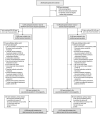Respiratory Syncytial Virus Prefusion F Protein Vaccine Is Efficacious in Older Adults With Underlying Medical Conditions
- PMID: 37698366
- PMCID: PMC10810713
- DOI: 10.1093/cid/ciad471
Respiratory Syncytial Virus Prefusion F Protein Vaccine Is Efficacious in Older Adults With Underlying Medical Conditions
Abstract
Background: Older adults with chronic cardiorespiratory or endocrine/metabolic conditions are at increased risk of respiratory syncytial virus (RSV)-related acute respiratory illness (RSV-ARI) and severe respiratory disease. In an ongoing, randomized, placebo-controlled, multicountry, phase 3 trial in ≥60-year-old participants, an AS01E-adjuvanted RSV prefusion F protein-based vaccine (RSVPreF3 OA) was efficacious against RSV-related lower respiratory tract disease (RSV-LRTD), severe RSV-LRTD, and RSV-ARI. We evaluated efficacy and immunogenicity among participants with coexisting cardiorespiratory or endocrine/metabolic conditions that increase the risk of severe RSV disease ("conditions of interest").
Methods: Medically stable ≥60-year-old participants received 1 dose of RSVPreF3 OA or placebo. Efficacy against first RSV-LRTD and RSV-ARI episodes was assessed in subgroups with/without coexisting cardiorespiratory or endocrine/metabolic conditions of interest. Immunogenicity was analyzed post hoc in these subgroups.
Results: In total, 12 467 participants received RSVPreF3 OA and 12 499 received placebo. Of these, 39.6% (RSVPreF3 OA) and 38.9% (placebo) had ≥1 coexisting condition of interest. The median efficacy follow-up was 6.7 months. Efficacy against RSV-LRTD was high in participants with ≥1 condition of interest (94.6%), ≥1 cardiorespiratory (92.1%), ≥1 endocrine/metabolic (100%), and ≥2 conditions of interest (92.0%). Efficacy against RSV-ARI was 81.0% in participants with ≥1 condition of interest (88.1% for cardiorespiratory, 79.4% for endocrine/metabolic conditions) and 88.0% in participants with ≥2 conditions of interest. Postvaccination neutralizing titers were at least as high in participants with ≥1 condition of interest as in those without.
Conclusions: RSVPreF3 OA was efficacious against RSV-LRTD and RSV-ARI in older adults with coexisting medical conditions associated with an increased risk of severe RSV disease.
Clinical trials registration: ClinicalTrials.gov: NCT04886596.
Keywords: RSV; cardiorespiratory; comorbidity; respiratory tract illness; vaccination.
© The Author(s) 2023. Published by Oxford University Press on behalf of Infectious Diseases Society of America.
Conflict of interest statement
Potential conflicts of interest. R. G. F. declares having received payment from GSK as a speaker for promotional programs and support for travel related to these activities. R. A. I. declares that his institution received a grant from GSK for conducting the trial. K. S. declares that her institution received funding from GSK for conducting the trial and that she is a member of the independent data monitoring committee for the AReSVi-006 trial (without receiving payment). D. G. L. and A. P. declare funding from GSK for conducting the trial. A. P. declares that his institution received grants from Chiesi, AstraZeneca, GSK, Sanofi, and Agenzia Italiana del Farmaco; that he received consulting fees from Chiesi, AstraZeneca, GSK, Novartis, Sanofi, Avillion, and ELPEN Pharmaceuticals; payment for participation in data safety monitoring boards or advisory boards from Chiesi, AstraZeneca, GSK, MSD, Novartis, Sanofi, IQVIA, Avillion, and ELPEN Pharmaceuticals; and honoraria from Chiesi, AstraZeneca, GSK, Menarini, Novartis, Zambon, Mundipharma, Sanofi, Edmond Pharmaceuticals, IQVIA, Avillion, and ELPEN Pharmaceuticals. M. G. I. declares that his institution received funding from GSK for RSV vaccine trials; he also received author royalties from UpToDate, consulting fees from Adagio Therapeutics, ADMA Biologics, AlloVir, Atea, Cidara Therapeutics, Genentech/Roche, Janssen, Shionogi, Takeda, and Eurofins Viracor, and payment for participating in data safety monitoring boards or advisory boards from Adamis Pharmaceuticals, AlloVir, CSL Behring, Janssen, Merck, Seqirus, Takeda, and Talaris. L. F., M. P. D., C. M., M. V. d. W., L. K., and V. H. are employed by GSK; L. F., M. P. D., C. M., M. V. d. W., V. H., and L. K. have stock options or shares from GSK. All authors have submitted the ICMJE Form for Disclosure of Potential Conflicts of Interest. Conflicts that the editors consider relevant to the content of the manuscript have been disclosed.
Figures



References
-
- Falsey AR, Hennessey PA, Formica MA, Cox C, Walsh EE. Respiratory syncytial virus infection in elderly and high-risk adults. N Engl J Med 2005; 352:1749–59. - PubMed
-
- Nam HH, Ison MG. Respiratory syncytial virus infection in adults. BMJ 2019; 366:l5021. - PubMed
-
- Branche AR, Falsey AR. Respiratory syncytial virus infection in older adults: an under-recognized problem. Drugs Aging 2015; 32:261–9. - PubMed

